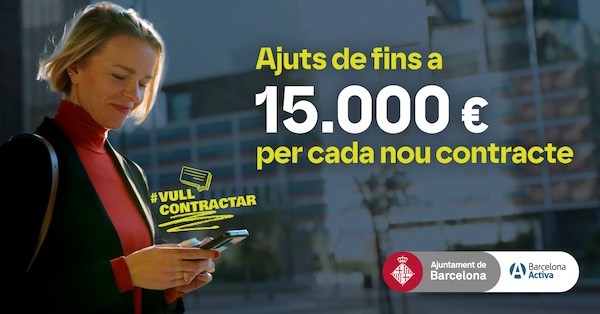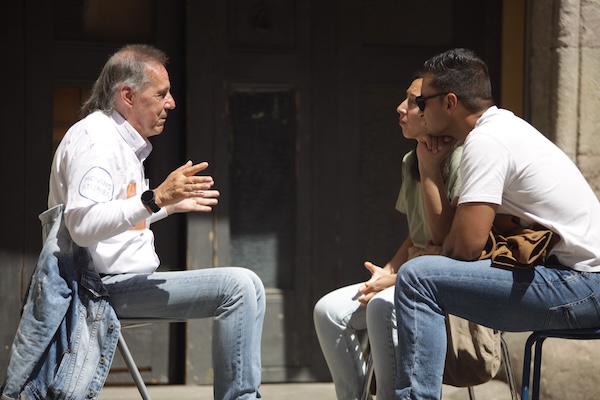Esade Alumni Social is closing the year with a roundtable on measuring the impact of social organizations and companies
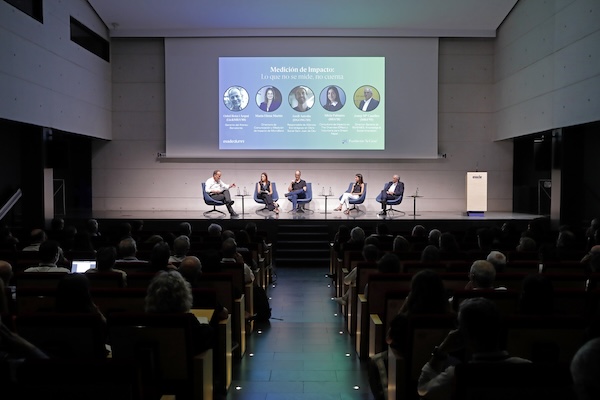
The closing event of the nineteenth edition of Esade Alumni Social’s impact initiatives brought the community together to celebrate its commitment to social transformation, and crucially to address the burgeoning imperative to measure impact. With the slogan “What isn’t measured doesn’t count,” the event focused on how social organizations and companies are assessing their real impact and thus transforming the way they operate.
The work of volunteers was also recognized at the event, and it became a platform for the exchange of experiences on data reliability, the measurement process, and internal difficulties, highlighting the fact that impact is something that comes from action and has to be systematically measured in both NGO’s and companies.
Measuring impact as a cornerstone of change
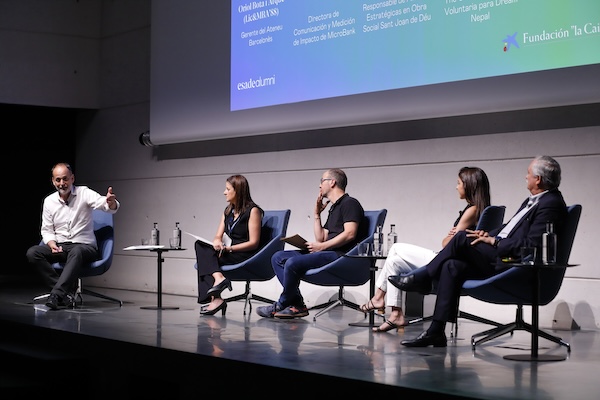
Oriol Bota i Arqué (Lic&MBA 88), director of the Ateneu Barcelonès and moderator of the roundtable, opened the event with a statement: “Good managers have to focus on managing well, and that’s why if it exists and has an impact, it has to be measured. Esade has always highlighted the case study method, and that’s why we’re going to analyze four cases of companies, associations, foundations, and projects, because measurement applies to all of them.” His speech laid the groundwork for an in-depth debate on how measurement is a key part of sustainability and transparency. Tools like SROI (Social Return on Investment), Social Value Integrated (SVI), and Change Theory were cited as essential in this process.
The roundtable featured the participation of professionals who shared their specific experiences, the lessons that emerged from these processes for both the third sector and the business world, and how this knowledge is shaping their evolution.
María Elena Martín, director of Communication and Impact Measurement at MicroBank, underscored the strategic integration of impact: “Impact is part of the bank’s strategy, and if we don’t measure impact we don’t know whether we’re fulfilling our purpose.” She also stressed the importance of internal and external credibility when she said that, “Earning credibility from other areas in the organization is important.” With 600 annual surveys for entrepreneurial projects, MicroBank creates trust through data analysis. Martín celebrated the fact that, “Some challenges have been overcome. Fortunately, now the economic part of a project is not the only thing valued; so is the social impact.” She concluded with an optimistic outlook: “Regulation is needed, and there is some fraud, but I look towards the future with excitement and cannot imagine not measuring what I’m doing.”
Next, Jordi Antolín (DGONG 10), Head of Strategic Alliances at Obra Social Sant Joan de Déu and a touchstone of the Magic Line Project, stressed the importance of monitoring the measurement process to ascertain the opinions of interest groups. “Leading the project enables you to monitor the measurement process, ascertain interest groups’ opinions, and provide information to all the organizations and people who are supporting the project. It's as much what you do as how you do it.” Antolín also discussed the existing barriers and stated that “there are barriers to measurement, both economic and cultural, because people want to invest more in the intervention itself than in measuring it.” However, he was hopeful for the future: “Younger people have greater social and environmental awareness and will be more demanding about measuring impact. Measurement is leaving its mark.”
Alicia Palmero (BBA 18), an Impacto Consultant at The Overview Effect and a volunteer for the Dream Nepal Foundation, illustrated how measurement facilitates dialogue with the corporate world. “We wanted to be able to stand before an investor and talk the same business language, and it helped us to tell the story with numbers and data.” Palmero acknowledged different languages in different sectors: “The languages in the corporate world and the third social sector are different, as the latter is much more cautious when calculating SROI.” She upheld measurement as an essential tool in decision-making: “Measurement is important in reinvesting resources and making informed decisions, knowing where it is the most relevant. I would like measurement and impact to be the main tool for business generation in all organizations.”
Finally, Josep M. Caselles (MBA 93), general manager at INVENIES, Knowledge & Social Innovation, and consultant in the process of measuring Esade Alumni Social’s impact, stressed organizations’ intrinsic social value. “The goal is to determine an organization’s social value to see how we bring this value and show it to stakeholders, for example.” Caselles stated that the real “competitive advantage is the story of how we bring value to the world around us,” and he reflected on how the perception of value evolves: “We’ve learned how to work with the profit-and-loss statement, and the economic result is the residual value that reaches shareholders. What we’re seeing here is higher value.” He concluded that, “we are finding more and more examples of institutions that want to have a social impact, and this trend is only going to continue because social impact is in no way incompatible with economic impact.”
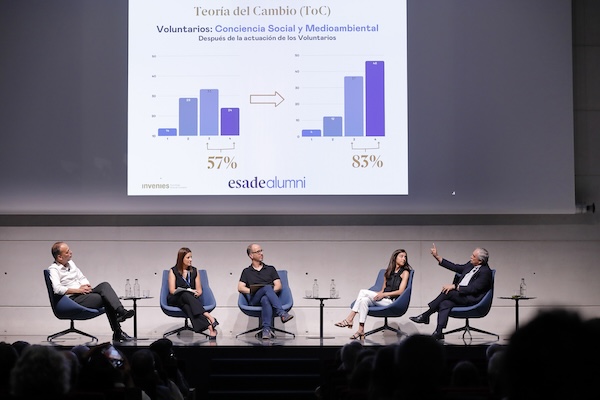
The day was a space for not only reflection but also celebration of Esade Alumni Social’s tangible results. Change Theory applied to its programs shows a significant increase in social and environmental awareness among its giving-back volunteers, rising from 57% to 83%. Furthermore, 35% of the participating organizations noticed greater closeness with the business world with the goal of forging alliances. One particularly revelatory piece of information is the social profitability of the Giving-Back Consultants program and the Hackathon, which was 2.97 euros for every euro invested, a promising result that has risen since 2020 (the first time Esade Alumni Social measured its impact).
Voices of the transformation
After one year of dedication and commitment, Esade Alumni Social participants shared their experiences to provide a personal perspective on the impact of Giving-Back Consultants not only on the organizations they have supported but also on their own professional and personal development.
Clara Fundaró, bachelor’s student in in Global Governance, Economics & Legal Order (‘26) and volunteer in the Calala Women’s Fund project
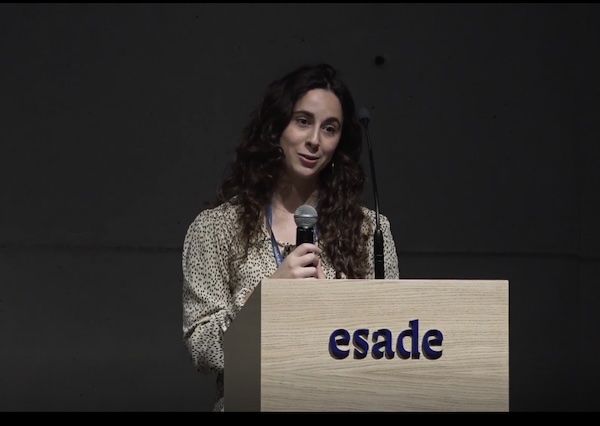 “This year I had the opportunity to participate in one of the Giving-Back Consultants projects organized by Esade Alumni, and I wanted to share my experience from a student’s standpoint. It was extremely enriching for me and allowed me to learn a lot both professionally and personally. I was assigned to the Calala Women’s Fund project, an NGO that fights for women’s development and empowerment. I worked with a group of alumni, and together we developed a strategic communication plan. Not only did I learn a lot, but I also had the chance to figure out what I want to do with my life, especially professionally. Thanks to this experience, I was able to get my start in the working world, apply what I’m studying, and find what truly motivates and excites me. Initiatives like Giving-Back Consultants have a positive social impact, plus they provide students like me with the opportunity to learn and find their vocation. I think this is one of the project’s main advantages.”
“This year I had the opportunity to participate in one of the Giving-Back Consultants projects organized by Esade Alumni, and I wanted to share my experience from a student’s standpoint. It was extremely enriching for me and allowed me to learn a lot both professionally and personally. I was assigned to the Calala Women’s Fund project, an NGO that fights for women’s development and empowerment. I worked with a group of alumni, and together we developed a strategic communication plan. Not only did I learn a lot, but I also had the chance to figure out what I want to do with my life, especially professionally. Thanks to this experience, I was able to get my start in the working world, apply what I’m studying, and find what truly motivates and excites me. Initiatives like Giving-Back Consultants have a positive social impact, plus they provide students like me with the opportunity to learn and find their vocation. I think this is one of the project’s main advantages.”
Montse Oliveras, head of Finances and General Services at the Catalan Foundations Coordinator
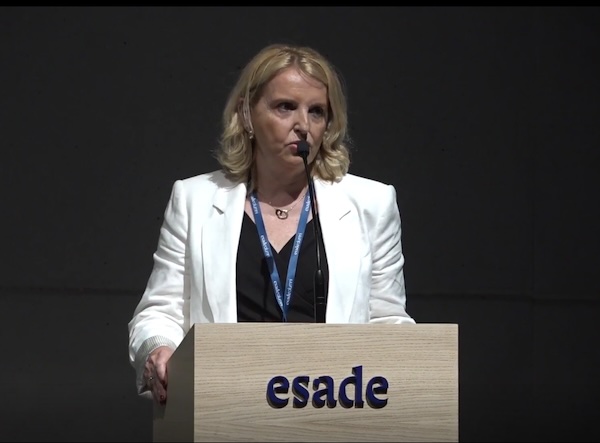 “We applied to Giving-Back Consultants because we’ve been in the midst of a digitalization process for the past couple of years and we were looking for an outside perspective that was not contaminated by an over-analysis of our own needs. What we found was a team of people who got 100% involved with our digital transformation project. We worked for eight months to create a digital transformation plan that now just needs to be implemented. They helped us detect aspects we hadn’t seen, either because we’re too involved in the day-to-day operations or because of their incredible expertise. We’re extremely grateful because it’s a project that is moving forward.”
“We applied to Giving-Back Consultants because we’ve been in the midst of a digitalization process for the past couple of years and we were looking for an outside perspective that was not contaminated by an over-analysis of our own needs. What we found was a team of people who got 100% involved with our digital transformation project. We worked for eight months to create a digital transformation plan that now just needs to be implemented. They helped us detect aspects we hadn’t seen, either because we’re too involved in the day-to-day operations or because of their incredible expertise. We’re extremely grateful because it’s a project that is moving forward.”
Javier Mascarell (ADE ‘96) and volunteer in the project with Iluro Foundation
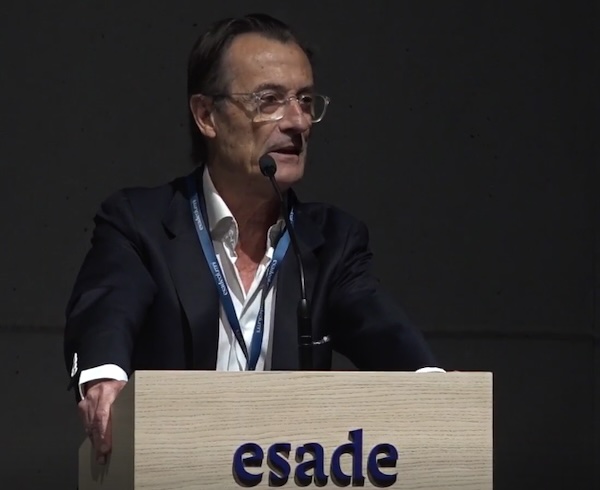
What better motivation than to show appreciation by giving your time, knowledge, and experience to a so-called third sector organization whose mission is precisely to promoting our society’s wellbeing and sustainability? We had a clear, explicit though not easy mandate for Espai Laru, the Iluro Foundation’s sports activities center in Mataró: to identify and quantify any new income opportunities that could further foster the cultural and social work that this foundation is carrying out in the Maresme, and specifically in the city of Mataró. They were very grateful, opened their doors to us, and created a climate of trust and incredible approachability, a crucial factor in the success of any consulting project like this one. It’s not only about a report or a final deliverable; it’s about much more. It’s about listening, learning, adapting, sharing, and co-creating, which are the keys to getting the organization’s goals and our contributions to line up. As a guide for the project’s success: responsibility and ability to adapt. It’s truly worth it!”
The closure made it clear that measuring impact is here to stay, and that it is a consolidated work area in social organizations and a growing area for all organizations – business or social – that aspire to create real, sustainable change. The tools are out there, and so are success stories, and the Esade Alumni community’s commitment continues to grow. Measuring leads not only to accountability but also to learning, evolving, and multiplying the impact.
The testimonials collected during the event show that when talent and purpose are aligned, the social value created may be extraordinary. After all, what isn’t measured doesn’t count… but what is measured is enhanced. And that’s precisely what Esade Alumni Social will continue to promote: knowledge, collaboration, and commitment for a future with impact.




 “This year I had the opportunity to participate in one of the Giving-Back Consultants projects organized by Esade Alumni, and I wanted to share my experience from a student’s standpoint. It was extremely enriching for me and allowed me to learn a lot both professionally and personally. I was assigned to the Calala Women’s Fund project, an NGO that fights for women’s development and empowerment. I worked with a group of alumni, and together we developed a strategic communication plan. Not only did I learn a lot, but I also had the chance to figure out what I want to do with my life, especially professionally. Thanks to this experience, I was able to get my start in the working world, apply what I’m studying, and find what truly motivates and excites me. Initiatives like Giving-Back Consultants have a positive social impact, plus they provide students like me with the opportunity to learn and find their vocation. I think this is one of the project’s main advantages.”
“This year I had the opportunity to participate in one of the Giving-Back Consultants projects organized by Esade Alumni, and I wanted to share my experience from a student’s standpoint. It was extremely enriching for me and allowed me to learn a lot both professionally and personally. I was assigned to the Calala Women’s Fund project, an NGO that fights for women’s development and empowerment. I worked with a group of alumni, and together we developed a strategic communication plan. Not only did I learn a lot, but I also had the chance to figure out what I want to do with my life, especially professionally. Thanks to this experience, I was able to get my start in the working world, apply what I’m studying, and find what truly motivates and excites me. Initiatives like Giving-Back Consultants have a positive social impact, plus they provide students like me with the opportunity to learn and find their vocation. I think this is one of the project’s main advantages.” “We applied to Giving-Back Consultants because we’ve been in the midst of a digitalization process for the past couple of years and we were looking for an outside perspective that was not contaminated by an over-analysis of our own needs. What we found was a team of people who got 100% involved with our digital transformation project. We worked for eight months to create a digital transformation plan that now just needs to be implemented. They helped us detect aspects we hadn’t seen, either because we’re too involved in the day-to-day operations or because of their incredible expertise. We’re extremely grateful because it’s a project that is moving forward.”
“We applied to Giving-Back Consultants because we’ve been in the midst of a digitalization process for the past couple of years and we were looking for an outside perspective that was not contaminated by an over-analysis of our own needs. What we found was a team of people who got 100% involved with our digital transformation project. We worked for eight months to create a digital transformation plan that now just needs to be implemented. They helped us detect aspects we hadn’t seen, either because we’re too involved in the day-to-day operations or because of their incredible expertise. We’re extremely grateful because it’s a project that is moving forward.”
